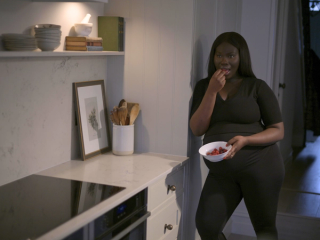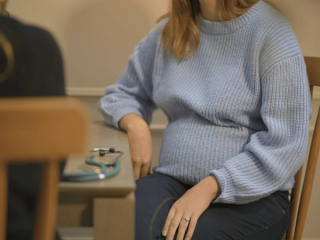
- Home
- Advice And Support
- Pregnancy
- Pregnancy Diet
- Vitamins & Supplements To Take Throughout Pregnancy
Vitamins & supplements to take throughout pregnancy
Discover the essential supplements for a healthy pregnancy, including folic acid, vitamin D, and iron, tailored for each trimester.
Eating a healthy balanced diet through all trimesters of your pregnancy will help ensure you achieve most of your nutritional requirements. However, to make sure you get all the vitamins and minerals you need, some pregnancy supplements are recommended.
1st trimester
The choice of pregnancy supplements for a healthy pregnancy can be confusing. There are a range of pregnancy multivitamins on the market, but will they be sufficient to meet your needs? Let’s break down the essentials for the first trimester.
Folic Acid
Folic acid helps prevent neural tube defects, including spina bifida. The NHS recommends that you take 400 mcg of folic acid every day, either once you start planning your pregnancy, or as soon as you find out you’re pregnant.
This should continue until the 12th week of pregnancy, unless your healthcare professional advises you that you need to take a higher dose due to your pregnancy being at higher risk. If you have any concerns regarding this, speak to your GP or other Healthcare Professional.
You can get a natural form of folic acid (folate) from eating leafy vegetables and many breakfast cereals are fortified with folic acid, but it’s difficult to get enough folate needed for pregnancy from your diet alone.
Vitamin D
Vitamin D regulates the amount of calcium and phosphate in the body, which are needed to keep bones, teeth and muscles healthy.
The main source of vitamin D is from the summer sunlight on our skin, which our bodies use to create vitamin D. However, during the winter months, the sun isn’t strong enough for the body to make vitamin D, and as it is only found in a few foods – such as oily fish and eggs – all adults and children over 4 years old are recommended to take 10 mcg of vitamin D daily through the winter months and all year round for those with little or no exposure to the sun.
A daily dose of 10 mcg of vitamin D is strongly recommended during pregnancy in autumn and winter.
Iron Supplements
Iron supplements are not routinely recommended to all pregnant women. However, if your iron level becomes low, your GP or midwife will advise you to take iron supplements.
Iron is important in making red blood cells, which carry oxygen around the body. A lack of iron can lead to iron deficiency anaemia. Most people should be able to get all the iron they need by eating a varied and balanced diet; Lean meat, green leafy vegetables, fortified breakfast cereals, dried fruit, and nuts all contain iron.
Pregnancy multivitamin
There are many pregnancy supplements on the market, enabling you to get all the additional vitamins and minerals you need in one dose. However, if you choose to take a pregnancy multivitamin, make sure it doesn’t contain Vitamin A/retinol, fish liver oil or other liver products. Speak to your healthcare professional if you’re unsure about which pregnancy multivitamin is right for you.
Pregnancy supplements in the 2nd and 3rd trimester
No additional supplements are routinely needed in the second and third trimester, unless recommended by your healthcare professional.
You can stop taking folic acid supplements after week 12 of pregnancy, unless advised otherwise, but continue with your vitamin D (if needed), iron (if recommended) and pregnancy multivitamin (if you’ve chosen to take one).
Remember to avoid supplements containing vitamin A, liver and liver products like fish liver oil. And don’t forget that you will get the majority of vitamins and minerals you need for a healthy pregnancy simply by eating a healthy balanced diet.
If you have any questions or concerns over which supplements you should be taking, talk to your health professional for guidance.





